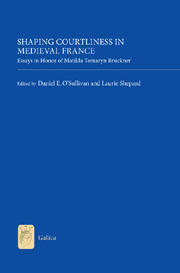Book contents
- Frontmatter
- Contents
- List of Illustrations
- Acknowledgements
- Introduction
- Matilda Tomaryn Bruckner: A Bibliography
- Part I Shaping Real and Fictive Courts
- A Perfume of Reality? Desublimating the Courtly
- Shaping the Case: the Olim and the Parlement de Paris under King Louis IX
- Charles d'Orléans and the Wars of the Roses: Yorkist and Tudor Implications of British Library MS Royal 16 F ii
- Part II Shaping Courtly Narrative
- Part III Shaping Women's Voices in Medieval France
- Part IV Shaping the Courtly Other
- Envoi
- List of Contributors
- Index
- Tabula Gratulatoria
- Already Published
Charles d'Orléans and the Wars of the Roses: Yorkist and Tudor Implications of British Library MS Royal 16 F ii
from Part I - Shaping Real and Fictive Courts
Published online by Cambridge University Press: 05 May 2013
- Frontmatter
- Contents
- List of Illustrations
- Acknowledgements
- Introduction
- Matilda Tomaryn Bruckner: A Bibliography
- Part I Shaping Real and Fictive Courts
- A Perfume of Reality? Desublimating the Courtly
- Shaping the Case: the Olim and the Parlement de Paris under King Louis IX
- Charles d'Orléans and the Wars of the Roses: Yorkist and Tudor Implications of British Library MS Royal 16 F ii
- Part II Shaping Courtly Narrative
- Part III Shaping Women's Voices in Medieval France
- Part IV Shaping the Courtly Other
- Envoi
- List of Contributors
- Index
- Tabula Gratulatoria
- Already Published
Summary
The British Library's Royal Manuscript 16 F ii was composed in the late fifteenth century to instruct a young English prince in the courtly repertories of love and, for finale, to offer him some simple ethical advice on how to govern. The question implicitly raised by the book's design is whether the emotional and rhetorical exploration of love will hinder or, on the contrary, assist the youthful Plantagenet reader to become an astute and just ruler. The dominant figure in the anthology is, curiously enough, Charles d'Orléans, a Valois enemy seized in 1415 at the Battle of Agincourt and only released from English captivity a quarter of a century later. The codex houses some 164 poems by Charles, which then fill more than half of its total number of folios. The poet-duke's looming presence in the book is underscored by three full-page illuminations that show him successively as a boy about to be admitted to the court of Love, a captive attempting to negotiate his release, and a great lord humbly beseeching the Virgin Mary to rescue his homeland (figures 1–3). The present paper examines the historical parallels and forms of courtly savoir faire that the makers of Royal 16 F ii intended to impress upon their readers and patrons by first setting Charles's poems on center stage and then ushering in prose disquisitions on love and the duties of princes.
- Type
- Chapter
- Information
- Shaping Courtliness in Medieval FranceEssays in Honor of Matilda Tomaryn Bruckner, pp. 61 - 80Publisher: Boydell & BrewerPrint publication year: 2013



